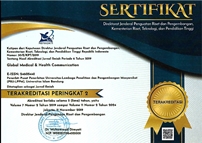Effect of Massage and Bathing or Swimming toward Baby Weight Improvement
Abstract
Body weight or anthropometric measure is the most important and most frequently used measure to see the development of infants. Stimulating the growth in infants aged 4 to 6 months can be done in two ways: massage the baby's body and continue by bathing or swimming. This study aimed to analyze the effect of massage and bathing or swimming on an infant's weight gain in Kinara Mom and Baby Spa, Kerkep village, Gurah district, Kediri regency. The research design is quasi-experimental, with one group pre-test-post-test design approach, carried out in August–October 2021. The sample was babies aged 4–6 months using purposive sampling with a sample size of 20 babies—independent variables were baby massage and bathing or swimming on infants, and the dependent variable was weight gain. The instrument used is a weight-monitoring sheet. Data were analyzed using pairs sample t-test analysis. The results showed that all 20 babies experienced weight gain. The conclusion is that massage and bathing or swimming affect weight gain in infants aged 4–6 months.
Keywords
Full Text:
PDFReferences
Kementerian Kesehatan Republik Indonesia. Profil kesehatan Indonesia tahun 2019. Jakarta: Kementerian Kesehatan Republik Indonesia; 2020.
Dewi QS, Trisnasari A. Hubungan frekuensi baby spa dengan perkembangan bayi usia 4–6 bulan. JKK. 2015;11(1):1–6.
Pratyahara D. The miracle of touch for your baby. Yogyakarta: Javalitera; 2012.
Pados BF, McGlothen-Bell K. Benefits of infant massage for infants and parents in the NICU. Nurs Womens Health. 2019;23(3):265–71.
Prastiani DB, Setyaningrum I. Hubungan frekuensi baby spa dengan pertumbuhan fisik bayi usia 6–12 bulan. J Keperawatan Respati Yogyakarta. 2017:4(1):80–4.
Kurniarum A, Suroso, Suwanti. Frekuensi kunjungan solus per aqua (spa) bayi kaitannya dengan kenaikan berat badan bayi. Interest J Ilmu Kesehat. 2013;2(2):65–72.
Ekasari U, Arum RM. Hubungan frekuensi kunjungan baby spa dengan kenaikan berat badan bayi usia 3–12 bulan di Klinik Luqi Medika. J Kesehat Ibu Anak Akademi Kebidanan An-Nur. 2018;3(1):16–22.
Margiana W, Muflihah IS. Pengaruh baby spa terhadap kenaikan berat badan bayi di Rumah Sehat Kita Purwokerto. Viva Medika. 2018;11(2):29–31.
Marni. Pengaruh pijat bayi terhadap peningkatan berat badan pada bayi. J Kebidanan Indones. 2019;10(1):12–8.
Utami S, Rusmil K, Gamayani U. Perbedaan pijat dan spa bayi terhadap pola tidur dan peningkatan berat badan pada bayi usia 3–5 bulan. JKM. 2019;5(4):371–80.
Jiang XM, Zeng JL, Yu XR, Chen TT, Chen QY, Chen XQ. Effects of swimming and touching on physiological jaundice of neonates within ten days of birth. Life Sci J. 2014;11(7):882–5.
Nasution AFD, Nuraidah, Imelda. The effect of baby massage on the sleep quality of 3-12 months babies in private midwive Jambi City. NSC Nurs. 2021;3(2):23–35.
Noorbaya S, Saidah RNMS. The effect of baby massage toward baby sleep quantity on the age of 3–6 months in South Sempaja Sub-district, North Samarinda in 2019. MJMR. 2020;4(1):37–42.
Saputro H, Bahiya C. The effects of baby massage to sleep quality in infant age 1–7 months. JRPH. 2021;2(2):88–94.
Nissim M, Ram-Tsur R, Zion M, Mevarech Z, Ben-Soussan TD. Effects of aquatic motor activities on early childhood cognitive and motor development. Open J Soc Sci. 2014;2(12):24–39.
Frank NM, Lynch KF, Uusitalo U, Yang J, Lönnrot M, Virtanen SM, et al. The relationship between breastfeeding and reported respiratory and gastrointestinal infection rates in young children. BMC Pediatr. 2019;19(1):339.
Ndembo VP, Naburi H, Kisenge R, Leyna GH, Moshiro C. Poor weight gain and its predictors among preterm neonates admitted at Muhimbili National Hospital in Dar-es-salaam, Tanzania: a prospective cohort study. BMC Pediatr. 2021;21(1):493.
Küpers LK, L'Abée C, Bocca G, Stolk RP, Sauer PJ, Corpeleijn E. Determinants of weight gain during the first two years of life—The GECKO Drenthe birth cohort. PLoS One. 2015;10(7):e0133326.
Tette EM, Sifah EK, Nartey ET. Factors affecting malnutrition in children and the uptake of interventions to prevent the condition. BMC Pediatr. 2015;15:189.
Goh LH, How CH, Ng KH. Failure to thrive in babies and toddlers. Singapore Med J. 2016;57(6):287–91.
Moshi CC, Sebastian PJ, Mushumbusi DG, Azizi KA, Meghji WP, Kitunda ME, et al. Determinants of underweight among children aged 0–23 months in Tanzania. Food Sci Nutr. 2022;10(4):1167–74.
DOI: https://doi.org/10.29313/gmhc.v10i3.8906
pISSN 2301-9123 | eISSN 2460-5441
Visitor since 19 October 2016:
Global Medical and Health Communication is licensed under a Creative Commons Attribution-NonCommercial-ShareAlike 4.0 International License.






























.png)
_(1).png)
_(1).jpg)
